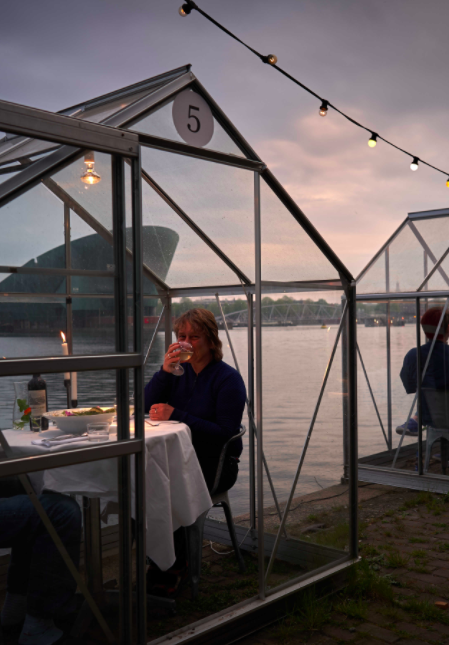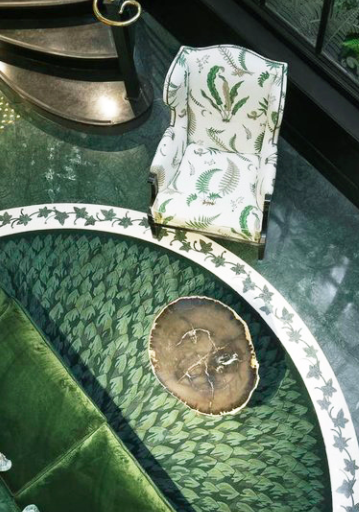Covid-19: a catalyst for change
Earlier this year we looked at the impacts of the Covid-19 pandemic across six key sectors, and explored what this meant for brands and businesses. As we emerge from a second lockdown, The Future Laboratory reflects on how this has played out, from phygital rehabilitation to at-home imagination travel kits
Beauty & Wellness : Recuperative Living Macrotrend
In the aftermath of Covid-19, consumers’ collective concerns about hygiene, wellbeing and immunity will drive new directions in beauty and wellness focused on phygital rehabilitation. Now, beauty, health and wellness companies are putting growth ambitions to one side to focus on being iterative, responsive and in-the-moment with their customers, and to become indispensable in people’s lives.
Latest case studies:
: L'Oréal Paris’s virtual make-up products act as hyper-real filters for Zoom, Microsoft Teams, Google Hangouts and social media apps. Known as Signature Faces, it offers users 10 virtual make-up looks ranging from Plump Shot, a gloss-like sheen for the eyelids and lips, to Fire Match’s reddish smoky eye. Available initially on Instagram and Snapchat, users can overlay the Signature Faces filters in real time using cameras on computers and smartphones. Read more.
: Flexible fitness membership platform ClassPass is expanding to offer on-demand salon and spa services. The company is working with two companies – Priv in the US and Blow in the UK – to enable ClassPass members to book hair and nail treatments via the app with their credits. The one-to-one treatments include manicures, pedicures, haircuts, blowdries and massages. Read more.
: Meiyume is addressing the hygiene concerns of beauty retailers and customers with touchless testers. Maintaining a high level of shopping experience is one of the main challenges of the post-Covid-19 beauty industry. In order to help maintain a sensory experience in-store, Meiyume is offering a series of touchless sampling testers for skincare products and fragrances. Read more.
30 November 2020
Author: The Future Laboratory
Image: Learning Communities in Nature by Third Nature, Structured Environment and Henrik Innovation
Share
𝕏
Retail : Repurposed Retail Market
As Covid-19 hits real estate, vacant department stores, shopping malls and their car parks are being given a new lease of life. For department stores and shopping malls, the situation is no different. In an age of Storefront Salvation and facing mounting pressure from coronavirus, businesses are exploring ways they can repurpose their square footage to offer something more suited to the current climate.
Latest case studies:
: Amazon’s new facility, open at the Industry City campus, will fulfil grocery delivery orders in Brooklyn. Marking the first permanent online-only store to open in Sunset Park, the site is closed to walk-in visitors, but appeals to the growing demand for online grocery shopping. The facility, created by Amazon and Whole Foods Market, is designed to better serve the Brooklyn community through increased efficiency, dedicated staff teams and exclusive discounts. Read more.
: Gucci’s client services hub in Florence has launched one such faux store – with cameras and tv-style lighting – as part of its new remote clientele strategy. Gucci Live, the brand’s new video service, connects store staff with consumers via mobile or laptop, and is the first of its kind in luxury. Read microtrend.
: Architecture studio MVRDV has transformed an unused shopping centre into Tainan Spring, a sunken park and public pool. Described as a ‘lush lagoon’, the project has r-worked the vacant Chinatown mall as part of plans to rejuvenate the area. Combining a lagoon for families to play and lounge in, as well as plants, playgrounds, gathering spaces and arcades, MVRDV has retained some of the existing architecture of the mall. Read more.
‘This new delivery-only retail model will allow Whole Foods Market to serve even more customers and continue to meet the growing demand for grocery delivery.’
AmazonWorkplace : Reworking the Workplace Market
Inter-pandemic, the office is undergoing a reconceptualisation, from the systems and layout of the workspace, to materials and touchless technologies. As employers undertake assessments of the physical workplace and the changes required, they are reconsidering not only the purpose of the office but its interior features, materiality and how it can benefit those in attendance.
Latest case studies:
: Lighting brand Artemide’s ultraviolet technology is transforming interior lighting into a whole-space sanitiser. Its Integralis system can be fitted into new light fixtures and is controllable via an app. This functionality enables the light to emit regular, natural light frequencies when a room is occupied, and a germ-fighting invisible UV spectrum when the room is vacant. Find out more.
: Microsoft Teams software will soon encourage workers to engage in a virtual daily commute. Set to launch in 2021, the platform update will allow at-home users to ‘commute’ at the beginning and end of their working day to create a greater sense of separation between working and non-working hours. Read more.
: Design studio Livit has created a detached office allowing remote workers to immerse themselves directly in nature. The Studypod was created as a response to the global pandemic and the rapid rise in remote working. It can be used as an indoor or an outdoor home-office solution. The design aims to provide a place for quiet work from a user’s garden, or on set at a photo studio, for example. Read more.

Food & Drink : Pandemic Dining Market
As they respond to the coronavirus, restaurateurs have an opportunity to redesign future dining spaces and reclaim their role in the public realm. Eating out will, in turn, take on new meaning for consumers and the spaces that cater for them. As well as rethinking their layouts and spatial formats to meet new health and safety requirements, restaurants must redefine the type, value and purpose of the culinary experiences they offer.
Latest case studies:
: Mediamatic has launched an isolation-friendly dining experience on the waterfront near Amsterdam central station. Designed to abide by social distancing measures, the concept brings together locally sourced food and crafted Amsterdam brews. Read more.
: Design studio Boir is releasing a conceptual tableware collection for socially distant dining. Featuring a series of steel and stone objects that enable food to be shared at a safe distance, the New Normal collection aims to prompt intimacy even amid current restrictions. The collection comprises five items, including a bread basket divided by a barrier, and long spoons that enable couples to feed each other from a distance. Read more.
: A new report from Blackhawk Network shows that online restaurant gift cards are becoming more popular as the holiday seasons approaches. According to the study, consumers are projected to spend 29% more on restaurant e-commerce gift cards during the holiday period than they did in 2019. Find out more.
: Serres Séparées photographed by Willem Velthoven for Mediamatic, Amsterdam
Travel & Hospitality : Neighbourhood Tourism Market
Facing a long-term drop in tourism, the travel and hospitality sector is reframing strategies away from international visitors – and towards local citizens. In response, travel brands must rethink their messaging, services and entire tourism strategies, switching their focus from seasoned globe-trotters to the highly discerning and culture-hungry locals.
Latest case studies:
: Danish outdoors company Nordisk has teamed up with the Danish embassy in Japan to create a hygge-inspired campsite in Ugakei. Situated in Uga Valley, the luxury site is due to open in 2021, located among dense forests and natural waterfalls. The site will offer a variety of accommodation options, including permanent tents and cabins, alongside communal outdoor facilities. Read more.
: The Loop of Wisdom is a rooftop trail that aims to elevate public walking and jogging routes. Perched atop the museum and reception centre of chip manufacturer Uni-Hiku, the design by Powerhouse Company is intended to reflect the natural undulation in the local Chengdu terrain, while promoting health and wellness. Find out more.
: IKEA is encouraging customers to see their home as a form of cultural escape with its Vacation in a Box initiative. Conceptualised by Memac Ogilvy Dubai, each box is themed around a global destination – Paris, Turkey, the Maldives and Tokyo – and comprises a selection of Ikea products to convey the feeling of travelling there. Read more.
‘With our Vacations in a Box, it’s easy for people to experience a French-style candlelit dinner or sip green tea while kneeling on cushions inspired by Tokyo.’
Carla Klumpenaar, general manager of marketing, communications and interior design at IKEA UAELuxury : Omnilux Lifestyles Macrotrend
The luxury experience of the future will no longer rely on tactile human-to-human moments, but anytime attainment, anywhere in the world. In this digitally bolstered second existence, we can anticipate luxury brands, goods and services that adapt and follow customers in their daily routines. Travel brands will pre-empt luxurians’ health needs before each trip, while aspirational affluents will shop via virtual malls.
Latest case studies:
: Net-a-Porter has partnered with Animal Crossing to create the luxury retailer’s first digital island within the popular game. The Net-a-Porter island invites players to explore a series of virtual attractions inspired by the physical Net-a-Porter headquarters in London, such as a photography studio and an editorial room. Read more.
: Luxury retailer Louis Vuitton is taking a creative approach to the challenges posed by Covid-19, opting to live-stream its physical fashion show to LinkedIn. Rounding off the spring/summer season in Paris, the brand posits an experimental future for catwalks while maintaining the experience of a physical location. Read more.
: Whisper Networks - Luxury brands are focusing on invitation-only, experience-led micro-communities to uphold an aura of exclusivity in the era of luxury omnipresence. Read microtrend.
: Hôtel de Nocé, Boucheron, Paris. Visuals by Holly Wadsworth of HWVisual

For more research and analysis surrounding the pandemic, follow the Covid-19 series on LS:N Global.
Want to read more?
Become a member today!
Sign up to one of our subscribtion packages and get unlimited access to a hive of insights - from microtrends and macro trends to market reports, daily news, research across eight industry sectors and much more.
Discover our memberships
Already a member? Click here to login
